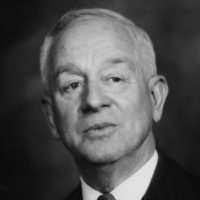
Peyton Rous
The Rockefeller Institute
For contributions concerning the causes of cancers, the source of antibodies, and the mechanism of blood cell generation and destruction in human beings.
Our modern knowledge of the cancer process has been constructed to a large extent around the major contributions of Peyton Rous. His original demonstration of the cell-free transmission of fowl neoplasms was complete and at the same time revolutionary. A storm center of discussion among workers in cancer research for 40 years, its significance for an understanding of cancer has been fully appreciated only recently. This work remains a landmark not only in the field of its direct applications—cancer research—but also in virology as a whole.
With similar skill, Peyton Rous helped to create modern hematology. Thirty years ago, the mechanisms of blood generation and destruction were prime medical mysteries. The studies of Dr. Rous and his colleagues helped transform blood transfusion from a major surgical undertaking to a routine technique. His findings also made possible the first blood banks for preserving and storing this life fluid. Additionally, his studies led physicians to a new understanding of how to treat the problem of anemia, as well as new insight into the source and formation of antibodies in the blood.
Dr. Rous's later work revealed the carcinogenic effect of hydrocarbons, virus-induction of mammalian cancer and complementary actions of carcinogens and viruses in cancer development. This work underlies the research concept that hidden or latent viruses may spring into action under apparently unrelated stimuli and trigger cancer in human beings.
